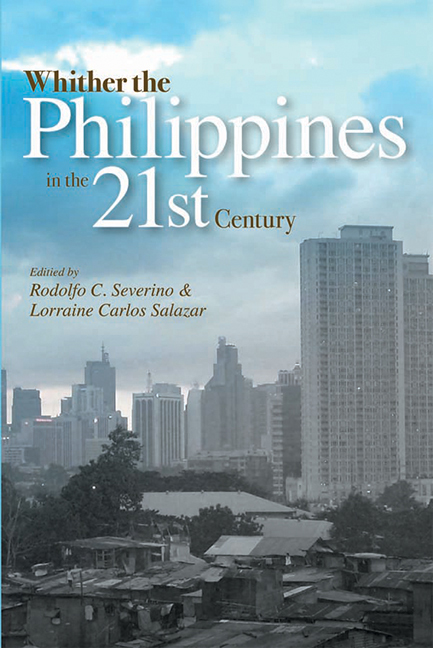Book contents
- Frontmatter
- Contents
- List of Illustrations
- Foreword
- Acknowledgements
- The Contributors
- List of Abbreviations
- Map of Southeast Asia
- 1 The Philippines in Southeast Asia
- 2 From Regime Crisis to System Change
- 3 Proposed Constitutional Reforms for Good Governance and Nation Building
- 4 The Military in Philippine Politics
- 5 Religion and Politics
- 6 The Philippine Press
- 7 Macroeconomic Issues and Challenges
- 8 Investment Climate and Business Opportunities
- 9 Why Does Poverty Persist in the Philippines?
- 10 Diaspora, Remittances, and Poverty
- 11 The Philippine Development Record
- 12 Sancho Panza in Buliok Complex
- 13 The Insurgency That Would Not Go Away
- 14 Whither the Philippines in the 21st Century?
- Index
10 - Diaspora, Remittances, and Poverty
Published online by Cambridge University Press: 21 October 2015
- Frontmatter
- Contents
- List of Illustrations
- Foreword
- Acknowledgements
- The Contributors
- List of Abbreviations
- Map of Southeast Asia
- 1 The Philippines in Southeast Asia
- 2 From Regime Crisis to System Change
- 3 Proposed Constitutional Reforms for Good Governance and Nation Building
- 4 The Military in Philippine Politics
- 5 Religion and Politics
- 6 The Philippine Press
- 7 Macroeconomic Issues and Challenges
- 8 Investment Climate and Business Opportunities
- 9 Why Does Poverty Persist in the Philippines?
- 10 Diaspora, Remittances, and Poverty
- 11 The Philippine Development Record
- 12 Sancho Panza in Buliok Complex
- 13 The Insurgency That Would Not Go Away
- 14 Whither the Philippines in the 21st Century?
- Index
Summary
INTRODUCTION
Remittances are one of the many dimensions of international migration that of late has attracted a great deal of attention from academics, public officials, and the media. For one thing, the magnitudes have increased sharply, at rates even faster than the departure of migrant workers. For another, in many developing countries, remittances have begun to significantly exceed foreign direct investment (FDI), capital market flows, or official development assistance (ODA). Moreover, remittances provide timely support to otherwise shaky balance of payments and fiscal positions. Further, remittances appear to contribute importantly to lifting households out of poverty, as well as benefit the wider community through the multiplier effects of increased spending.
The Philippines is reputed to be the world's third highest net remittance recipient country after India and Mexico. In 2006, remittances were officially recorded at US$12.8 billion, representing about 10 per cent of GDP. Clearly, remittances resulting from the Filipino diaspora have become a major factor in the economic and social life of the country. This chapter focuses on the home country consequences of remittances, addressing the question whether and to what extent remittances contribute to poverty reduction and regional development in the Philippines.
The next two sections revisit the causes and consequences of international migration, drawing on the more recent literature. The fourth section focuses on remittances in terms of what motivate them and what impact they may have in the labour-sending countries. The chapter then describes the pattern of labour migration and remittances by region in the Philippines. The sixth section carries out an econometric analysis to see if remittances matter to poverty alleviation and regional development. The chapter concludes with the main points and some implications for policy.
CAUSES OF INTERNATIONAL MIGRATION
Given the pronounced economic and social inequalities across the various countries of the world, one would expect floods of migrants from the worse- off to the better-off places.
- Type
- Chapter
- Information
- Whither the Philippines in the 21st Century? , pp. 222 - 245Publisher: ISEAS–Yusof Ishak InstitutePrint publication year: 2007



